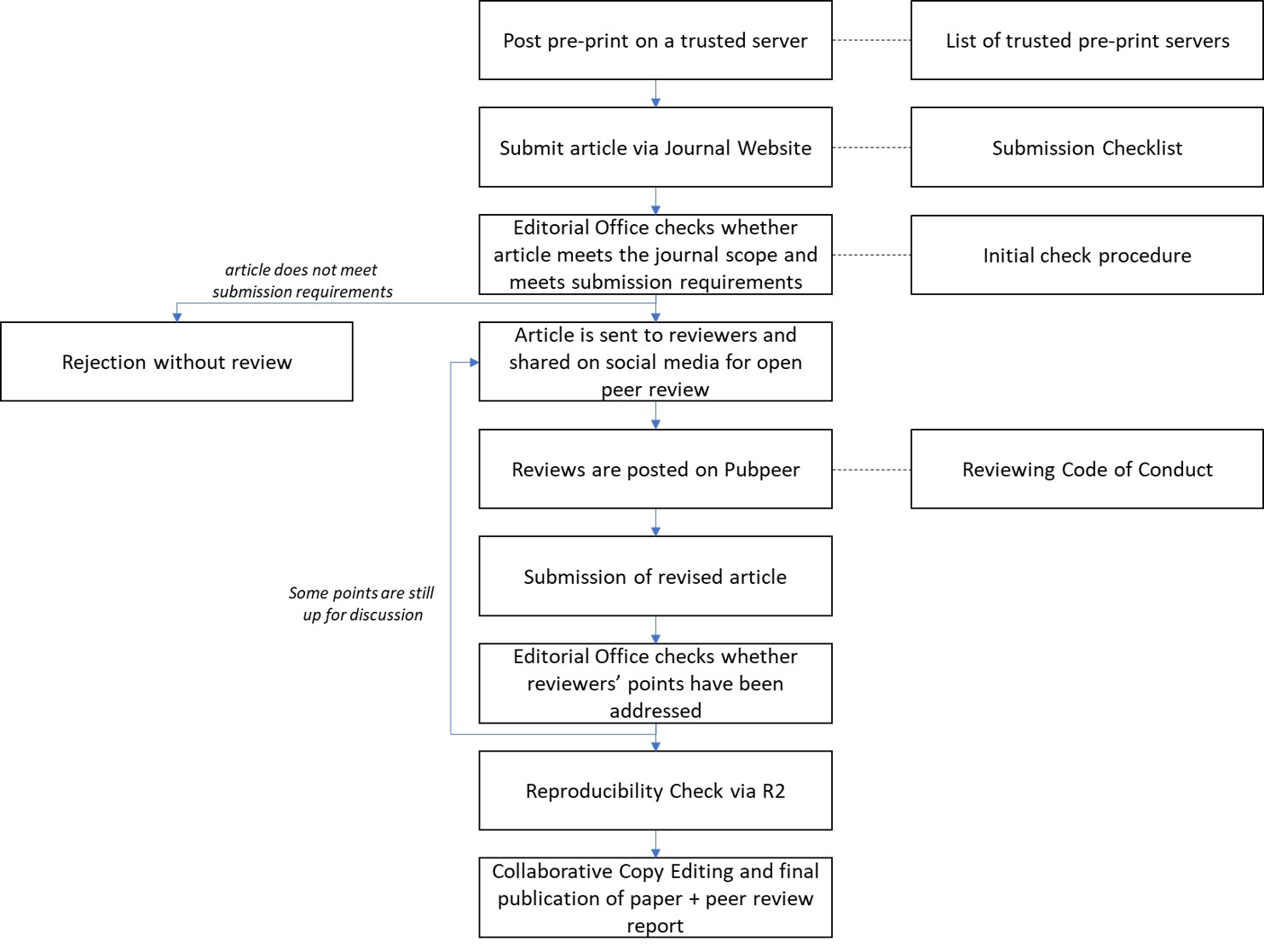About the Journal

Replication Research is an interdisciplinary journal for replication research. This includes reproductions, where the same code and data are used to verify the originally reported results, close replications, where new data is collected with a method closely resembling an original study, or conceptual replications, where a previously tested hypothesis is re-tested using new methods and new data. We currently accept replications from the social, cognitive, and behavioral sciences as well as medicine.
Diamond Open Access without Processing Fees
Replication Research is a researcher-led journal that is and will forever be free to read and to publish (Diamond Open Access, no Author Processing Charges).
Open and Persistent Peer Review
All reviews are published after each round of peer-review, that is, regardless whether the manuscript is accepted or rejected for publication. Reviews are added as comments on the submitted preprint via PubPeer.
Reproducibility
Before publication, reproducibility checks are conducted for the reported results. Articles are not published unless these reproducibility checks are successful. This process is overseen by the reproducibility manager and conducted by the reproducibility team.
Article Types
Replication Research accepts submissions that include reproducibility checks (including multiverse analyses and many analyst studies), internal or direct replications, close replications, and conceptual replications as long as the target study is specified and published.
Student first authors can but do not have to request “student report” status for their submissions. For these submissions, soft review deadlines are shorter (2 weeks instead of 4 weeks) and only a response from one reviewer is required. However, adherence to TOP guidelines (see below) and reproducibility check are still required.
For more information, see the Submission Guidelines.
TOP Guidelines
The following table stems from the Center for Open Science. Replication Research requires level 3 adherence to Transparency and Openness Promotion (TOP) guidelines. Adherence to TOP Research Practices is checked by reviewers in a structured form that they are required to submit alongside their review. Verification Practices are organized by the journal, that is the reproducibility manager. Replication Research accepts all types of Verification Studies.
| Criterion | Level | Explanation |
|---|---|---|
| Study Registration | 3 | A party independent from the authors certified that the study was registered at an appropriate time, and the registration was complete per disciplinary best-practice. |
| Study Protocol |
3 | A party independent from the authors certified that the study protocol was shared and complete per disciplinary best-practice. |
| Analysis Plan |
3 | A party independent from the authors certified that the analysis plan was shared and complete per disciplinary best-practice. |
| Materials Transparency | 3 | A party independent from the authors certified that materials were deposited and documented per disciplinary best-practice. |
| Data Transparency |
3 | A party independent from the authors certified that data were deposited with metadata per disciplinary best-practice. |
| Analytic Code Transparency |
3 | A party independent from the authors certified that analytic code was deposited and documented per disciplinary best-practice. |
| Reporting Transparency | 3 | A party independent from the authors certified that the authors adhered to the cited reporting guideline. |
| Verification Practice | Definition |
|---|---|
| Comprehensive Reporting | A party independent from the authors verified that the study registration, protocol, and analysis plan match the final report–and the final report acknowledges any deviations from these outputs. |
| Computational Reproducibility | A party independent from the authors verified that reported results reproduce using shared data and code. |
| Verification Study Type | Definition |
|---|---|
| Replication | A study that aims to provide diagnostic evidence about claims from a prior study by repeating the original study procedures in a new sample. |
| Registered Report | A registered study in which a study protocol and analysis plan are peer reviewed, and the study is pre-accepted by a publication outlet, before the research is undertaken. |
| Multiverse | A study that tests the research question of interest across multiple datasets arising from different, reasonable choices for processing and analyzing the same data. |
| Many Analyst | A study in which independent analysis teams conduct plausible alternative analyses of a research question on the same dataset. |
Publication Process
Additional Information
ISSN: —
Top Factor: 28
The Nordic List: —
DOAJ: —
Funding: Supported by the Münster Center for Open Science, University of Münster
Contributions and References
These guidelines are shared under a CC 4.0 by Attribution License and have been created by Lukas Röseler (Writing - first draft) and the Replication Research Consortium (list of members avaiable online, https://osf.io/p4dzb). They are loosely based on the submission guidelines from Meta Psychology (https://open.lnu.se/index.php/metapsychology/about/submissions).
